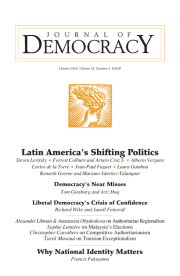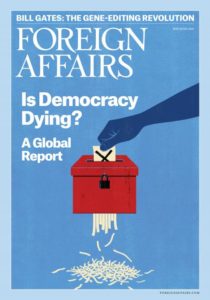Hungary’s ruling party pledged Wednesday to respect democracy and the rule of law as center-right parties across Europe weighed whether to eject it and the Hungarian prime minister from the biggest and most influential political group in the European Union, The Washington Post reports:
Fidesz party lawmakers made the commitment at a congress of the European People’s Party group, where an “emergency resolution” was introduced partly to establish where the stridently nationalist party’s sympathies lay. Delegates at the congress vowed to promote the values of “human dignity, freedom, democracy, equality, the rule of law and respect for human rights.” democracy, equality, the rule of law and respect for human rights.”
The EPP, the group uniting Europe’s center-right parties, has been wringing its hands over whether to keep Hungarian Prime Minister Viktor Orban and Fidesz in the fold or cut them loose before European Parliament elections in May.
 Nationalistic and populist leaders are now challenging democratic norms, notes Tom Ginsburg, a University of Chicago professor of law and political science, and co-author with Aziz Huq of Democracy’s “Near Misses,” an article in The Journal of Democracy.
Nationalistic and populist leaders are now challenging democratic norms, notes Tom Ginsburg, a University of Chicago professor of law and political science, and co-author with Aziz Huq of Democracy’s “Near Misses,” an article in The Journal of Democracy.
Populism has been a standard reaction to liberal elitism since the French Revolution, argues Peter Berkowitz, a senior fellow at the Hoover Institution, Stanford University. The alliance between conservatism and the people—between elites devoted to preserving tradition and local communities and those who want them preserved—is as old as modern conservatism itself, he writes for The Wall Street Journal:
In a 1985 essay for this newspaper, Irving Kristol distinguished “the new populism” from the populism America’s founders feared, in which the people’s passions “overwhelm the political and legal process by which our democracy has traditionally operated.” Inept conduct of the Vietnam War, overreaching courts, failing schools and a broken criminal justice system had shattered the people’s confidence in the political elites.
“The common sense—not the passion, but the common sense—of the American people has been outraged over the past 20 years,” Kristol wrote, “by the persistent un-wisdom of their elected and appointed officials.”
The rise of “illiberal democracies” should compel us to think more about how the European Union has nurtured democracy, says Rosemary Byrne, associate professor of international law at Trinity College Dublin:
Coverage of the Law and Justice Party (PiS) in Poland often suggests that the sole reason for the government’s popularity is raging xenophobia and reactionary voters. The 2016 introduction by the PiS of a benefit programme, designed to eliminate extreme child poverty in Poland, is rarely given much attention. While the impact of the programme is still being assessed, initial simulations suggest a 76 per cent reduction in extreme child poverty. Such policies could easily generate electoral support in many corners of Europe, where, as the EU Fundamental Rights Agency reported this month, one in four children under 18 are at risk of poverty or social exclusion. In some member states, such as Romania, the figure is as high as one in two.
 “The social and economic ecosystem within which the democratic constitutional framework operates matters for its future health, and maybe even for its future survival,” Byrne writes for The Irish Times. “Our focus on pluralism and democracy might be more compelling to voters if poverty and inequality were addressed with the same vigor as civil and political rights.”
“The social and economic ecosystem within which the democratic constitutional framework operates matters for its future health, and maybe even for its future survival,” Byrne writes for The Irish Times. “Our focus on pluralism and democracy might be more compelling to voters if poverty and inequality were addressed with the same vigor as civil and political rights.”
Any shift in US policy toward promoting democracy will likely depend upon bipartisan initiatives within the US Congress, two observers suggest.
In the United States, the Congressional appropriations subcommittees that cover foreign operations, which handle the State Department and foreign aid budgets, are islands of bipartisanship, note Brian McKeon and Caroline Tess of the Penn Biden Center for Diplomacy and Global Engagement. They protect diplomatic resources and quietly advance worthwhile causes such as ending river blindness, promoting democracy, supporting girls’ education, and combating human trafficking. They also zealously guard their funding priorities, they write for Foreign Affairs:

The chair of the House subcommittee on human rights, for example, can shine a light on dark places by hearing testimony from leading dissidents and human rights defenders from China, Cuba, the Philippines, Russia, and Turkey. Such hearings would underscore the United States’ long-standing commitment to human rights for people everywhere.
Warning signs are on the rise for democracies all over the world, the Aspen Institute reports. While revolution or a military coup is often the death knell for democracy, according to Harvard University’s Daniel Ziblatt, democratic political systems can also simply wither away through the slow and steady weakening of key institutions and the erosion of political norms. Today, there are a growing number of countries where judicial independence, free and fair elections and a free press are being challenged. Which nations may be at greatest risk for authoritarianism? Is the world’s oldest democracy really in danger? Ziblatt will discuss how democratic institutions are being systematically undermined by elected leaders, and what can be done about it.
Daniel Ziblatt is the Eaton Professor of the Science of Government at Harvard University. He recently published “How Democracies Die,” co-authored by Steven Levitsky, Professor of Government at Harvard University.







